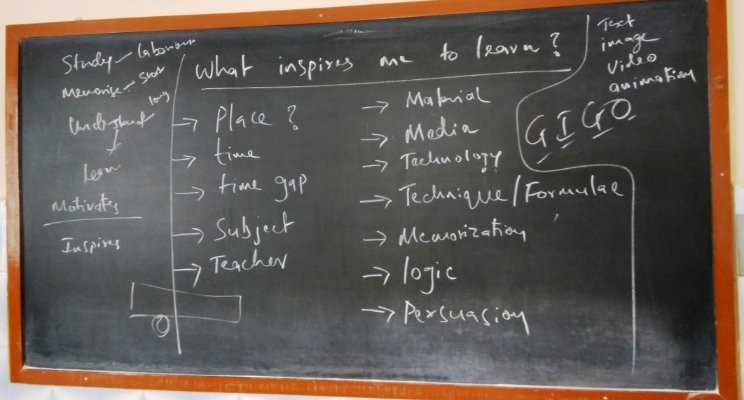
With the deep penetration of technology into every field, people are moving to a virtual world. Children and adolescent are seen busy with their individual self on the virtual platform rather than being physically active and in the real world. We have more friends on the social network but few in real life. The objective of technology and social sites is to bring the world closer but paradoxically it has created a digital divide where the child becomes a recluse and becomes absent-minded in absence of virtual world. Children have forgotten to live in the real world, parents pose queries as to what activity should be given to the child when his/her friend visits the home. This is a rising concern especially in the urban areas where the families have gone small and virtual relations seems easy and handy than going for real relations. However, real is ‘Real’ indeed and one should make efforts to have real relations where one can depend on in the time of need. Man, after all, is a social animal and shall be happy being in the real society rather than virtual world. How can we as parents help the child to develop friendship and have good friends? What role do we as parents have to play for getting our children good and real friends? Let’s try to understand this with the following concept. Hope this will be helpful to all such parents.
Friendship Meaning and Necessity
Friendship is actually a form of love. in fact, the ancient Greeks had a word, “phileos”, more or less equating to fraternal/brotherly love (friendship). Friendship can best be thought of as two people side by side looking forward toward a common goal. It’s an odd form of love in which people develop a relationship without relationship as a goal. We need friends to strengthen and encourage us as we strive to do right. We need friends to rejoice with us when good things happen and weep with us when bad things happen. The necessity of having friends means that we must be willing to make investments to build and maintain these important relationships. At any age, having friends provides support and promotes mental health and wellbeing. Children’s friendships are also very important for their social and emotional development. Through friendships, children learn how to relate with others. They develop social skills as they teach each other how to be good friends.
- Types of Friendship
There are many kinds of friendship and categories of friends. The discussion here will limit to the age 4 to 8 years when a child is in KG and is developing friends. There are mainly three types of friends in this period:
1. School Friends:
A child spends most of his/her productive time in the school. It is necessary for the child to have school friends to whom sharing is possible. Sharing in terms of talks, snacks, stationary, books, etc. A school friend will help the child to develop social and emotional skills. A teacher is someone who is an elder and is to be respected but a friend is someone who is of the same age and where such formalities are not to be kept. Thus a friend succeeds in giving life lessons when a teacher fails. It is with a friend that the child feels free to discuss and share anything as he/she know that such sharing will not be criticized or condemned. A child will start having all the good habits with a school friend, like, to wear a clean uniform, do good handwriting, bring healthy snacks, talk in a good manner, respect the teacher and elders, etc. Thus it is important that a child has school friends where such social skills along with manners and learning can be shared.
2. Family Friends (Siblings of the same age):
Apart from school, the child spends most of his/her time at home. In the Indian context, we still have a joint family system where a child could find siblings of the same age in the home itself. It is very important that a friendly approach is developed among siblings apart from family values. Family friends teach each other important family values like respect to elders, carrying out a family function jointly, sharing common resources of the family, etc. Thus a child should have friends in the family so as to learn such life-long values.
3. Friends in Neighbor:
Since the child spends most of the time home, he/she should have friends in the neighborhood of the same age. Friends from the different family and from the neighborhood are important as they help the child develop social skills like playing together, sharing toys, establish justice, etc. As a parent, you can play along with your child but sooner the child will come to know that you purposefully loose so that he/she wins and will lose the charm of playing with you. It is playing with the same age that the child gets satisfaction and the most important lesson of life; seeking justice and sportsman spirit; is learned from this. Thus a child should have friends in the neighborhood.
- How to encourage the development of friendship in the child
To encourage a child to develop friends is an art. The parents have to initiate this process by allowing the child to mingle around with the child of same age, ask the children to share toys or snacks with the other child. Allow the child to go to the friend’s home, invite the friend over to your home, etc. Parents play a major role in developing friends for the child. However, the following tips can be useful to encourage the development of friendship in children:
1) Provide children with opportunities to play with peers. This could involve deciding whether to share all of their toys or only some, or encouraging them to think about what games the other child would like to play when they arrive.
2) Teach positive social skills. Little things like smiles, looking at the person, knowing names and using a confident, friendly voice can make a big difference when making friends. Being able to better control negative emotions and paying attention to the needs and wants of others are also very important. Teach one behavior or social skill at a time and make sure the child is able to do it before introducing another skill. Show your child what to do.
3) Be a coach. Coaching involves prompting, reminding and encouraging (but not nagging!) children to use the skills they have learned. Coach your child to practice positive social skills in everyday situations with family members and friends.
4) Help children solve friendship conflicts. Talking problems through with a supportive adult helps children to think about what happens, how they feel about it and what to do next. Thinking things through like this helps to build more mature social skills.
5) Teach your child how to handle different social situations. You began to teach your toddler how to share and how to say “please” and “thank you”. Continue coaching your child as s/he grows older and encounters more social situations. If your child will be encountering a new or difficult situation, talk to him/her about it beforehand.
6) Help your child learn to see others’ points of view. Around the age of six or seven, children are more able to understand others’ feelings and points of view. For example, when reading with your child, stop and ask how a character is feeling and why he does certain things. Or when your child tells you about the situation at school, ask how she thinks the people felt and why they acted as they did.
7) Help your child learn to manage negative feelings and solve problems. When your child talks about how he is feeling, listen. Show you are listening by reflecting what he says. First, help your child identify the situation. Then help him brainstorm solutions to the situation. Talk about the solutions he comes up with and have him pick one.
- The importance of friends of the same age:
Generally, a successful friendship exists between persons of same age, character, and background. Friends are the loyal support for each other who aimlessly support during bad moments of life. Below the age of 7, friendships are based on physical (same age or gender) or geographical considerations (next-door neighbor) and are rather self-centered. There is little or no understanding of the other person’s perspective or feelings, or personality traits other than the avoidance of a playmate because “they are mean.” During the next stage of development (ages 7-9) the idea of reciprocity and awareness of the other child’s feelings begins. “Perspective taking,” or the recognition of how another child might feel given our actions, begins during this stage. A child will be comfortable with a child of his/her own age group, in such case sharing becomes interesting and motivating. The hesitation of the child can be removed when playing along with children of same age. Thus it is important that a child has friends of his/her own age group.
As a parent, you play a crucial role in your child’s social development. You cannot make friends for your child, but your love, patience, and support make it possible for your child to meet new people and make friends on her own. Friendships are very important to a school-age child. They help a child grow. They help him/her develop the self-confidence and social skills s/he will need as an adult.

